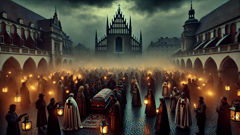Introduction
Beneath the sloping roofs of medieval Kraków, where the Vistula hissed like an old secret and the market square threw up lantern-glow and shadow, there lived a man the peasants called Pan Twardowski. He was not the sort of nobleman to content himself with his coat of arms and the rote lectures of tutors; he wanted the shape of things behind the shapes of things. He wanted names, causes, and the quiet language of why thunder answered thunder. People noticed him because he read from foreign books that smelled of oil and salt, because he walked late between church and tavern and brought back strange phrases, because he could carve a rune into a doorpost and the mice would not chew through the grain. His hunger for knowledge grew like ivy, and with it his impatience for ordinary means. So when rumor braided itself around an invitation — a pact, certain nights — Twardowski listened as closely as he had once listened to a master-copy of Aristotle. The bargain that he struck did not arrive as thunderbolts and horns; it came disguised in a visitor who knew the right compliments to give and the precise hour when the moon would be least honest. In exchange for a price, the visitor promised books unbound by local tongues, secrets of the stars, and the magic to alter small misfortunes. Twardowski accepted, and the bargain was written in a ledger inked with an unusual steadiness: one year of service and then, the visitor claimed with a flat politeness, the nobleman's soul. Yet the devil, as the country-side had taught by old wives and wandering priests, is seldom exact about the cornerstones of his deals, and Twardowski — clever, skeptical, and quick with loopholes he had learned from legal treatises — began a long game of cunning that would bend the small laws of heaven and hell. He sought not simply to enjoy power but to outthink the very notion of a fixed fate. When he walked through the city after the bargain, he bent his head as if to an invisible instructor; he read the faces of dogs and women with equal patience; he tested the limits of the pact by asking the devil for useless things first — a rooster that crowed at midnight, a shadow that answered in rhyme — and through those trivialities he learned the temperament and the rules of the thing he had invited into his life. Kraków listened and learned, too: tavern-tales grew into warnings, children put salt in their shoes to keep their feet from being taken, and clergy frowned until their beards became like wrung cloth. Twardowski's name became a hinge on which small moral discussions turned: to barter one’s soul was a cautionary tale told over porridge, but the man who had done it also became a mirror for the city’s curiosity. In this story, however, the mirror was cracked by wit. The bargain would not be a simple descent into ruin; it would be a contest of legalism, cunning conjuration, and the stubbornness of a human heart that refused the simple arithmetic of devilish contracts.
The Bargain at the Moonlit Balcony
The bargain was signed in the smell of rain and candle fat. Twardowski, who had once been tutored in lawbooks and believed an argument could shape a sword, asked the visitor — who called himself in turn a man of letters and then a man of commerce — to state his terms plainly. The visitor, whose eyes were coal-soft and whose smile was too wide for his years, placed a small, cracked ledger on the balcony rail and pushed a quill so that Twardowski could not refuse the politeness of playing at formalities. "One year," the man said. "Your name in my ledgers at one end, and my mark at the other. A single year wherein you may have what you ask. At the end of the year, your soul is mine. No more, no less." Twardowski, who read not because he loved easy answers but because he loved the texture of arguments, objected the way a mounted man objects to a law — with a focus that made him seem almost tender. "Is the soul defined?" he asked. "Is it the breath, the thought, the memory of names? If I spend my year within the sound of a church bell, does that change where the soul rests? If I sell only what I own and give what you ask in coin already spent, where, then, does your claim reach?" The visitor laughed like a purse being opened, and in his laughter was the small cruelty of brakes. "You seek cleverness," he said, "and so you shall have it. There are terms and there are terms. Names are precise. Mark and measure are only as good as the hand that reads them." The ledger was stitched with a leather Twardowski did not know, and when he ran his fingers along the margin the ink had the faint warmth of a human hand; the letters inside rearranged themselves like prey at a call. He signed with the same studied calm he used to sign his name on a deed, and though the quill trembled his signature found its place like the tail of a comet.

At first the advantages were small and elegant. The devil — if that was what the visitor truly was — gave Twardowski books that unfolded secrets like windows: the chemistry of dyes, the arithmetic of tides, a fold of Latin that contained more than one world. He placed spells in Twardowski’s hands not as thunder but as tools: a charm to mend a broken axle, an incantation to coax wheat from thin soil, a method to persuade a jealous neighbor to forget the exact weight of a debt. Twardowski became useful and feared in equal measure. Nobles came to him to ask how to read the stars for a wedding night; magistrates pressed their chests and offered lands if he would count the reasons behind a strange law. In dim rooms, men with hands like roots asked whether he could conjure an advantage before battle, and women with eyes like river pebbles wanted to know what moved a husband’s affections so that the right words might be spoken. Twardowski answered more often in qualifiers than commanders. His power was precise — an unlit candle would burn when he carved a symbol into its side; a storm could be nudged by a song that the devil taught him in the quiet hour. Yet with every favor fulfilled, the city’s watchful whispers grew. The priest said sins had multiplied like mice; the miller noticed flour that would not sour; merchants counted coin like men accounting for a flood.
Cunning, however, became a second practice for Twardowski. He was a man of loopholes and legal phrasing, and the ledger that took his name was as much a challenge to him as it was a sentence. To give a thing value he first wished it to be worthless. He asked the devil for a rooster that crowed at midnight and a horse that never could be ridden by those who expected to ride him; he asked for a shadow that would speak only in proverbs. In these small tests he found rules. The devil liked certainty: if the demand was precise, the gift would be precise. When Twardowski said, "A rooster that will crow at midnight and at no other hour," the rooster crowed at midnight but could be silenced by the sound of a child’s laughter, because the devil's precision had bounds. When Twardowski demanded an invulnerable sword, the devil supplied a blade that would not break skin but would vanish if used to strike someone in anger. These edges of language taught Twardowski the temperament of his patron. He learned the necessity of careful phrasing and the joy of turning rules back upon themselves.
Word of these tests reached the market and changed the pattern of people's talk. Mothers would whisper names of saints when dough was rising; men would spit into the doorway before considering a risky bet. Twardowski, meanwhile, tested larger gambits. He wrote contracts that declared the devil's power limited to certain hours and certain geographies. A musty parchment of his own devising read like this: "Whereas the party of the first part shall deliver unto the party of the second part the soul defined as the sum of breath and unaltered memory, hereby the party of the second part may not collect said soul while the party of the first part remains within the boundaries of a church, or while engaged in the sacraments, or riding no horse of iron or lead, nor upon a name not recorded by a magistrate." He sent that parchment sailing into the devil's ledger like a pebble skimming over a pond. The devil smiled when he read it and rapped his fingers with the patience of a man used to trading in particulars. "You are a legalist," he said, as if naming a hobby. "You will use language as a net. That is entertaining." This, Twardowski believed, was where victory might hide: the technicality, dressed in the humility of law, could be stronger than fire.
But the devil was not slow to adapt. If Twardowski sought sanctuary inside a church, the devil began to lay traps just beyond its threshold: a gust of wind that seemed holy but carried a curse; a woman asking for a last confession that was actually the outline of a collect to entangle memory. If Twardowski hid his thoughts in the written word, the devil would press a question so simple and so human it bypassed ink and landed straight into the folds of his heart. There was no lack of resource on either side; the contest became one of time, patience, and the improvisational use of language. Twardowski sold a trinket and bought a loophole; the devil sold a raven and bought a sorrow. Meanwhile, Kraków watched itself in the glass of rumor, and the story of the man who dared bargain with fate became not only a lesson in hubris but an odd parable about craftsmanship: a man who understood the world by its mechanisms might yet find that certain things — mercy, love, the stubbornness of a child's fingers — resisted ledger and ink.
Within this slow combat, the city did not remain neutral. Citizens chose sides in ways that echoed the small loyalties of a village. Some saw Twardowski as a charlatan dancing with forces he did not comprehend; others saw in him a necessary practitioner whose cleverness could bend misfortune for the common good. Priests published admonitions; a patroness raised hands and asked that he be called to advise her son; an old woman offered a charm and a warning in the same breath. Twardowski, who once had counted himself a man of intellect and not of emotion, found he was forced to reckon with the humanity that his bargains affected. He could bargain for learning and weather and wine, but bargains did not mend the ache of a widow’s sorrow or the dull absence inside a mother’s chest. His tricks could save a harvest but not a child's fever. And so the ledger's promise — great knowledge traded for an immaterial eventuality — became entangled with the things that could not be measured: compassion, regret, and the stubborn courage to circumvent fate through mercy rather than trickery. That tension would, later, help define the last and cleverest gambit Twardowski ever made, a conclusion that would rely on the communal memory of Kraków, the city’s churches, and the kind of loophole that no contract could imagine.
Wits, Spells, and the Long Game
After the initial exchange, when the ledger had warmed itself to the weight of a signature, Twardowski learned that power without subtlety is a blunt thing. He sought to make his knowledge not merely useful but invisible to the eyes of those who would prey upon it — to create protections that looked like good housekeeping rather than sorcery. He embroidered symbols into waistcoats, taught midwives an almost-innocuous rhyme that kept infants from a malady, and carved initials into a millstone that made the grain come out lighter. These small acts made him beloved and feared in peculiar measures; a noble might ask for his counsel and then pretend the advice came from a saint to avoid the shame of dealing with magics. Twardowski, who had not anticipated such delicate social alchemy, began to appreciate that magic works best when it wears the face of the ordinary.

The devil, in turn, adjusted his methods. Confrontations became less about fire and more about contractually exact ironies. When Twardowski demanded a way to avoid being taken on the day the ledger claimed his soul, the devil provided a clause of specificity so tight that any attempt to evade it with trickery would break like thin glass. The ledger said, in language the devil loved, that the soul would be claimed "at the end of one year reckoned from the eve of the signing, by any means permitted to the party of the second part within the law of nature and the exceptions herein provided." Twardowski read that phrasing as one reads a riddle, and he began to build strategies based on performance and interpretation.
One scheme involved the town’s magistrate and a false death. Twardowski persuaded a friendly apothecary to lend him a draught that simulated death by turning breathing shallow and skin cold to touch. He had himself carried in a cart past the church and through the town as if he were a corpse, with the bell tolling once for show and the priests murmuring rites to assure the populace. For three days, he lay in a quiet room where neighbors left quince and bread at the door. On the night the ledger's year should have been complete, the devil showed himself under the guise of a bailiff and reached toward what he believed was a willing soul. He found a body that did not stir. The devil swore a blue oath — the kind the night would remember — and vanished for the moment with disappointment and a few choice words about theatricality.
But another problem troubled Twardowski as much as the ledger's legalisms: the soft call of human attachments. He had not bargained for friendship and love to become the honest currency of his salvation. A woman named Marta, who ran a candle shop near the square and who had once offered Twardowski a bowl of soup for reasons he could not decipher, became central to his quiet defenses. She had a kind of courage that was not loud: she closed her shutters when trouble passed, she sang the city's work-songs at dusk, and she could, with a wag of her finger, get men to speak the truth about how their hearts had been damaged. Her small virtues were contagious; people who sought Twardowski's help often left with the knowledge that someone like Marta had been part of the bargain. The devil, who could count coincidences like coin, saw that human bonds were a currency he could not easily read. They were messy, unledgered, and generous to a fault.
Twardowski, who was neither saint nor brute, began to rely on those messy edges. He taught Marta a formula that made certain words hard to remember — a charm that, when sung at dawn, made the devilless memory of a countenance last and the memory of obligations fade like morning mist. People found themselves forgiving small offenses and forgetting grudges without noting why. Twardowski called it a miracle of social engineering; the priests called it a trick; Marta called it a kindness. Unknown to them, the ledger absorbed these changes as if they were the slow erosion of a coastline; the devil registered them as losses, like a gambler counting the weight of small coins that had slipped away.
As the year's end approached, the contest changed its nature from tactical maneuvers to a problem of spectacle. The devil loves a good tableau — a final collection that dazzles with inevitability — and he prepared to seize Twardowski in a manner suited to his tastes. He recognized that no law could bind all the contingencies of life, so he engineered a scenario in which Twardowski would be alone and defenseless: a summoned storm that toppled a bridge, a traveling carriage that would be late by the hour, a claim that would force the nobleman to travel outside the city's church-protected bounds. The devil, in all his precision, preferred certainty in the endgame.
Twardowski, however, had not become clever for the sake of cleverness. He had come to learn that the city around him, composed of priests, shopkeepers, seamstresses, and midwives, was not merely a chorus but an arsenal. He asked, not for weapons, but for a performance. He convinced the town to stage a funeral, one that would be legitimate enough to fool the ledger’s rules but communal enough that a trick could be disguised as piety rather than theatricality. People were wary but curious; the magistrate provided parchment; a priest lent some chants that had the right blend of solemnity and length; Marta tied wreaths with herbs that lent the smelling air a sense of mourning. Twardowski lay in the coffin one last time beneath a cloth heavy with prayers, and the city performed for the ledger in a way that made the devil uneasy. The devil arrived as a man of blackened coin and measured contempt, and he reached as a creditor reaches for something believed due.
What happened then became less a matter of magic and more a demonstration of communal imagination. Twardowski rose, not because he had tricked the devil alone, but because Kraków had consented to be the stage of his refusal. The priest intoned words with just enough truth to confuse the ledger’s binding nature; the magistrate declared the event a legal matter that required time; women wailed with such sincerity that even a device as cold as the ledger paused to measure it. The devil, who had always presumed the private and tidy nature of a soul exchange, found himself flummoxed by the messy, human weight of ritual and affection. He could argue the letter of contracts, but he could not easily argue against a city’s shared resolve. In the end, legend tells that he left with a portion of what he had expected to collect and a bitter resentment he carried like a splinter. Twardowski survived his year, scarred in ways that no ledger could describe, and he was left with knowledge that tasted of ash: the art he had purchased came at the cost of living in a world where his liberties were bound up with other people's choices.
The devil, though thwarted in that hour, did not vanish from the tale; his shadow remained in every quiet bargain, a reminder that knowledge taken by pact is never only a private matter. Twardowski's later years were the slow work of atonement and careful use of the talents he'd been given. He taught openly and clandestinely, asking students to promise small things to one another rather than to him. He built small protections into the city — a ritual for children, a remedy for flood seasons — and he died, some say, in solitude; others insist he left for a distant monastery to write a book of confessions. Whatever the truth, Kraków kept the story alive not as a single moral but as a family of warnings: beware deals made in half-lights; beware curiosity that forgets mercy; and remember that the clever man who tries to outwit fate may yet succeed if the city is willing to act as his loophole.
Conclusion
Legends grow because people need them; they are mnemonic scaffolds that hold the fragile architecture of a community’s memory. In Kraków, the story of Pan Twardowski became one such scaffold — not merely a cautionary tale of a man lost to the devil, but an instructive fable about the limits of private bargains in a public life. Twardowski was neither saint nor villain in whole; he was a man who asked too much of the world and then, when the world answered, found that saving himself required him to replenish the trust he had drawn upon. The moral is not neat. It does not say simply, "Do not bargain with evil," though it says that; it also says, quietly, "Cultivate the wild kindness that binds people to places and to one another," because sometimes the only loophole cleverness cannot invent is the human willingness to act with generosity and to perform a truth loudly enough to confuse the ledger of a demon. The devil in the tale becomes more than a tempter: he is a measuring rod, showing what is possible when knowledge is divorced from responsibility. Twardowski’s final act was not merely about defiance but about reweaving the city’s social fabric so that the net he once used for his own ends could catch others instead. Kraków, for its part, kept telling the tale at market stalls, in parish halls, while mending nets and teaching children the right words to say during a storm. In that way the legend became both warning and work: a story that taught how communities might outwit an inexorable end by practicing the small mercies that make life harder to claim and harder still to sell. If you ask the old women by the river, they will tell you that Twardowski’s greatest trick was not in cheating the devil but in discovering that fate could be met with friends and song rather than only with contracts and cunning. And if you walk Kraków at night and hear an odd crow or notice a shadow that lingers for no reason you can name, you might still feel the aftertaste of that bargain — a mixture of ash and wisdom — and understand why people keep the story alive: it helps them negotiate their own edges between curiosity and consequence.













